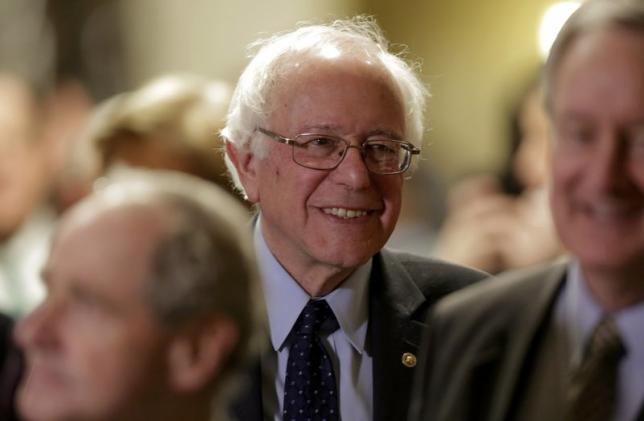
U.S. Democratic presidential candiate Bernie Sanders arrives to watch U.S. President Barack Obama’s State of the Union address to a joint session of Congress in Washington, January 12, 2016. REUTERS/Joshua Roberts . SAP is the sponsor of this coverage which is independently produced by the staff of Reuters News Agency.
Democratic presidential contender Bernie Sanders has chipped away at Hilary Clinton in all three states in Saturday’s elections, winning in Washington, Alaska and Hawaii.
He took at least 70% of the vote in all three states.
Sanders won 73% of the vote in Washington against 27% for Mrs Clinton, AP reports.
He won a massive 82% of the vote in Alaska, against 18% for Clinton. In the Hawaii caucus, Sanders won by 70% to 30%.
Sanders thanked his supporters and said his “campaign has the momentum”, but he still faces a tough task to overhaul Clinton.
Sanders still faces a steep uphill climb to overtake Clinton but the big victories in the West generated more momentum for his upstart campaign and could stave off calls from Democratic leaders that he should wrap up his bid in the name of party unity.
After Saturday’s caucuses, she leads Sanders by 1,243 delegates to 975, the Associated Press count shows.
Sanders, a U.S. senator from Vermont, needs to win up to two-thirds of the remaining delegates to catch Clinton, who will keep piling up delegates even when she loses under a Democratic Party system that awards them proportionally in all states.
“We are making significant inroads in Secretary Clinton’s lead and … we have a path to victory,” Sanders told cheering, chanting supporters in Madison, Wisconsin. “It is hard for anybody to deny that our campaign has the momentum.”
Clinton, the former secretary of state, has increasingly turned her attention toward a potential Nov. 8 general election showdown against Republican front-runner Donald Trump, claiming she is on the path to wrapping up the nomination.
Heading into Saturday, she led Sanders by about 300 pledged delegates in the race for the 2,382 delegates needed to be nominated at the party’s July convention in Philadelphia. Adding in the support of superdelegates – party leaders who are free to back any candidate – she has 1,690 delegates to 946 for Sanders.
“These wins will help him raise more funds for the next few weeks but I don’t think it changes the overall equation,” said Democratic strategist Jim Manley, a Clinton supporter. “Hillary Clinton has too big a lead.”
But Sanders has repeatedly said he is staying in the race until the convention, pointing to big crowds at his rallies and high turnout among young and first-time voters as proof of his viability. After raising $140 million, he has the money to fight on as long as he wants.
He has energized the party’s liberal base and young voters with his calls to rein in Wall Street and fight income inequality, a message that resonated in liberal Washington and other Western states. Sanders won in Utah and Idaho earlier this week.
“Don’t let anybody tell you we can’t win the nomination or the general election,” Sanders told supporters in Wisconsin, which holds the next key contest on April 5. “We are going to do both.”
All three contests on Saturday were caucuses, a format that has favored Sanders because it requires more commitment from voters. They also were in states with fewer of the black and Hispanic voters who have helped fuel Clinton’s lead.
“He was just more aligned with my values. I am young and I never knew there could be someone like him in politics,” said Samantha Burton of Seattle, who said Sanders was the first candidate who had inspired her to make a donation.
After Wisconsin, the Democratic race moves to contests in New York on April 19 and a bloc of five states in the Northeast, led by Pennsylvania, on April 26.
There were no contests on Saturday in the Republican race featuring Trump and rivals U.S. Senator Ted Cruz of Texas and Ohio Governor John Kasich.
On Saturday, the New York Times published a lengthy foreign policy-focused interview with Trump. The New York billionaire told the newspaper he might stop oil purchases from Saudi Arabia unless they provide troops to fight ISIS.
Trump also told the Times he was willing to rethink traditional U.S. alliances should he become president.
In an interview with CNN’s Tapper on “State of the Union” Sunday, Sanders said the United States needs to toughen its surveillance to stop Brussels-style ISIS attacks, adding that “we know who ISIS is.”
“It goes without saying that when you have attacks that take place, when 30 people get killed in Brussels, something went wrong … We have got to improve our efforts to make sure it does not happen again,” he added.
Sanders credited President Barack Obama for his handling of the fight against ISIS, saying that the terrorist organization is “on the defensive. They are retreating.”
“I think we know who ISIS is. We know those people who are planning attacks against our European allies and against ourselves,” he said.
